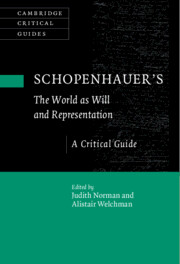Book contents
- Schopenhauer’s The World as Will and Representation
- Cambridge Critical Guides
- Schopenhauer’s The World as Will and Representation
- Copyright page
- Contents
- Contributors
- Acknowledgments
- Note on Texts, Translations, and Abbreviations
- Introduction: Schopenhauer in the Time of Pandemic
- Chapter 1 Different Kinds of Willing in Schopenhauer
- Chapter 2 Resignation
- Chapter 3 Appreciating Nature Aesthetically in The World as Will and Representation: Between Kant and Hegel
- Chapter 4 The Hour of Consecration: Inspiration and Cognition in Schopenhauer’s Genius
- Chapter 5 Experiencing Character as a Key for a Present-Day Interpretation of Schopenhauer
- Chapter 6 Schopenhauer in Dialogue with Fichte and Schelling: Schopenhauer’s Critique of Moral Fatalism and His Turn to Freedom from Willing
- Chapter 7 Schopenhauer’s Philosophy of Religion: (Hopeless) Romanticism?
- Chapter 8 Maja and Nieban in The World as Will and Representation
- Chapter 9 Schopenhauer, Universal Guilt, and Asceticism as the Expression of Universal Compassion
- Chapter 10 Seeing Things: Schopenhauer’s Kant Critique and Direct Realism
- Chapter 11 The Sciences in The World as Will and Representation
- Chapter 12 Pushing Back: Reading The World as Will and Representation as a Woman
- References
- Index
- Cambridge Critical Guides
Chapter 4 - The Hour of Consecration: Inspiration and Cognition in Schopenhauer’s Genius
Published online by Cambridge University Press: 08 December 2022
- Schopenhauer’s The World as Will and Representation
- Cambridge Critical Guides
- Schopenhauer’s The World as Will and Representation
- Copyright page
- Contents
- Contributors
- Acknowledgments
- Note on Texts, Translations, and Abbreviations
- Introduction: Schopenhauer in the Time of Pandemic
- Chapter 1 Different Kinds of Willing in Schopenhauer
- Chapter 2 Resignation
- Chapter 3 Appreciating Nature Aesthetically in The World as Will and Representation: Between Kant and Hegel
- Chapter 4 The Hour of Consecration: Inspiration and Cognition in Schopenhauer’s Genius
- Chapter 5 Experiencing Character as a Key for a Present-Day Interpretation of Schopenhauer
- Chapter 6 Schopenhauer in Dialogue with Fichte and Schelling: Schopenhauer’s Critique of Moral Fatalism and His Turn to Freedom from Willing
- Chapter 7 Schopenhauer’s Philosophy of Religion: (Hopeless) Romanticism?
- Chapter 8 Maja and Nieban in The World as Will and Representation
- Chapter 9 Schopenhauer, Universal Guilt, and Asceticism as the Expression of Universal Compassion
- Chapter 10 Seeing Things: Schopenhauer’s Kant Critique and Direct Realism
- Chapter 11 The Sciences in The World as Will and Representation
- Chapter 12 Pushing Back: Reading The World as Will and Representation as a Woman
- References
- Index
- Cambridge Critical Guides
Summary
Cheryl Foster examines Schopenhauer’s theory of genius, which she situates within a politics of knowledge. Many of our dominant social institutions devalue the arts which are overlooked as potential sources of knowledge. Foster argues that Schopenhauer (despite his own strong resources of bigotry) is in a position to address this injustice by making an argument for the distinction between talent and genius, or conceptual and intuitive understanding, and making a strong argument for the significance and distinctiveness of aesthetic, intuitive cognition. Foster looks carefully at Schopenhauer’s description of the experience of artistic inspiration, the receptivity distinctive of genius that enables artists to create aesthetically significant works. She finds that Schopenhauer has unexpected confirmation in the account Edith Wharton gave of her own artistic process. To realize the potential of Schopenhauer’s analysis, we need to free him from some of his reactionary investments, such as his anti-Semitism, misogyny, elitism, and mystifications. Foster carefully reconstructs a theory of genius and intuitive cognition that is both free from these elements and consistent with the phenomenology of artistic experience as reported by practicing artists. The result is a useful and accurate account of a vital source of nonconceptual knowledge.
Keywords
- Type
- Chapter
- Information
- Schopenhauer's 'The World as Will and Representation'A Critical Guide, pp. 74 - 103Publisher: Cambridge University PressPrint publication year: 2022



